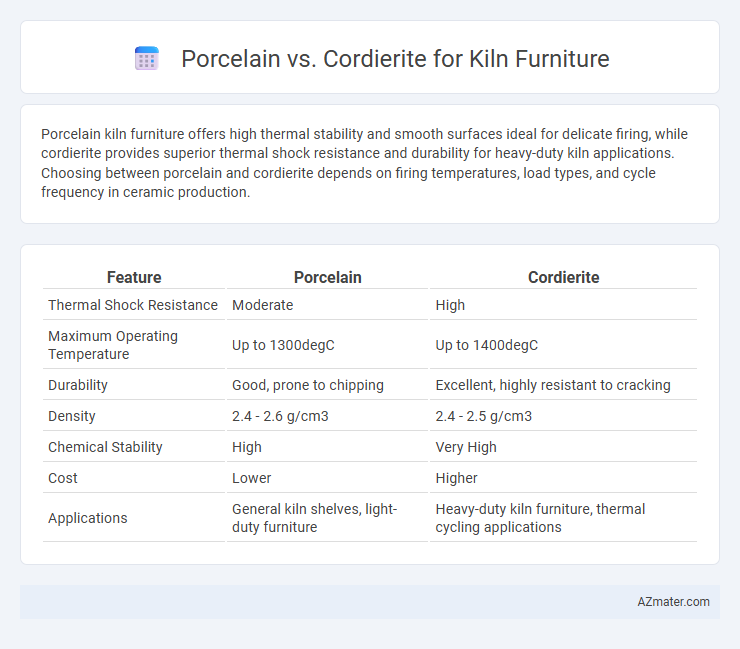Porcelain kiln furniture offers high thermal stability and smooth surfaces ideal for delicate firing, while cordierite provides superior thermal shock resistance and durability for heavy-duty kiln applications. Choosing between porcelain and cordierite depends on firing temperatures, load types, and cycle frequency in ceramic production.
Table of Comparison
| Feature | Porcelain | Cordierite |
|---|---|---|
| Thermal Shock Resistance | Moderate | High |
| Maximum Operating Temperature | Up to 1300degC | Up to 1400degC |
| Durability | Good, prone to chipping | Excellent, highly resistant to cracking |
| Density | 2.4 - 2.6 g/cm3 | 2.4 - 2.5 g/cm3 |
| Chemical Stability | High | Very High |
| Cost | Lower | Higher |
| Applications | General kiln shelves, light-duty furniture | Heavy-duty kiln furniture, thermal cycling applications |
Introduction to Kiln Furniture Materials
Porcelain and cordierite are common materials used for kiln furniture due to their excellent thermal properties and durability at high temperatures. Cordierite offers superior thermal shock resistance and stability, making it ideal for consistently rapid heating and cooling cycles, while porcelain provides a smooth surface and good thermal insulation suitable for lower-temperature firings. Choosing between porcelain and cordierite kiln furniture depends on the specific firing requirements, including maximum temperature, heating speed, and the type of ceramics being produced.
What is Porcelain Kiln Furniture?
Porcelain kiln furniture consists of heat-resistant shelves and supports crafted from high-quality porcelain, designed explicitly to withstand extreme temperatures up to 1300degC (2372degF) during firing processes. It offers excellent thermal stability, resistance to warping, and smooth surfaces that prevent glaze defects on ceramics. Porcelain kiln furniture is preferred for its durability and ability to maintain structural integrity even under repeated thermal cycling.
What is Cordierite Kiln Furniture?
Cordierite kiln furniture is a durable material used in high-temperature kiln settings, prized for its excellent thermal shock resistance and low thermal expansion. Made from a magnesium iron aluminium cyclosilicate mineral, cordierite withstands rapid temperature changes without cracking, making it ideal for supporting ceramics and glass during firing. Compared to porcelain, cordierite kiln furniture offers superior strength and longevity under repeated high-heat cycles.
Thermal Performance: Porcelain vs Cordierite
Cordierite exhibits superior thermal shock resistance and higher thermal stability compared to porcelain, making it ideal for kiln furniture exposed to rapid temperature changes. Porcelain offers excellent thermal insulation but tends to be more brittle and less resistant to thermal stress, which can lead to cracking under intense heat fluctuations. The enhanced durability of cordierite at temperatures up to 1280degC enables longer service life in high-temperature kiln applications.
Mechanical Strength and Durability Comparison
Cordierite kiln furniture exhibits superior mechanical strength and thermal shock resistance compared to porcelain, making it ideal for high-temperature applications in ceramics and glass industries. Porcelain offers good strength but tends to be more brittle and less resistant to rapid temperature changes, which limits its durability under intense kiln conditions. The enhanced durability of cordierite allows for longer service life and reduced replacement costs in industrial kiln operations.
Weight and Structural Considerations
Porcelain kiln furniture is generally lighter than cordierite, offering ease of handling and reduced kiln load, which can enhance energy efficiency. Cordierite provides superior structural strength and thermal shock resistance, making it ideal for heavy or larger ceramic pieces subjected to frequent temperature changes. Selecting between porcelain and cordierite depends on balancing weight constraints with the need for durable, long-lasting kiln supports capable of withstanding high thermal stress.
Thermal Shock Resistance: Which Is Better?
Cordierite kiln furniture offers superior thermal shock resistance due to its ability to withstand rapid temperature changes up to 1300degC without cracking. Porcelain, while durable and aesthetically pleasing, is more prone to thermal shock failure when exposed to sudden heating or cooling cycles. For high-temperature applications requiring frequent thermal cycling, cordierite is the preferred material to ensure longevity and structural integrity.
Cost Efficiency and Longevity
Porcelain kiln furniture offers a lower initial cost but tends to have a shorter lifespan due to its susceptibility to thermal shock and cracking under repeated high-temperature cycles. Cordierite kiln furniture commands a higher upfront investment yet delivers superior durability, thermal shock resistance, and longevity, reducing replacement frequency and long-term expenses. Evaluating the cost efficiency of kiln furniture hinges on balancing porcelain's affordability against cordierite's enhanced performance and extended service life in high-temperature ceramics and glass firing applications.
Best Applications for Porcelain vs Cordierite
Porcelain kiln furniture excels in high-temperature applications requiring excellent thermal shock resistance and chemical inertness, making it ideal for glass and ceramic firing processes. Cordierite kiln furniture offers superior thermal shock resistance and durability under rapid temperature changes, making it best suited for applications involving fluctuating heat cycles like pottery and stoneware firing. When choosing between porcelain and cordierite, consider porcelain for stability and smooth finishes and cordierite for enhanced mechanical strength and resistance to thermal stress.
Choosing the Right Kiln Furniture for Your Needs
Porcelain kiln furniture offers excellent thermal shock resistance and smooth surface finish, making it ideal for delicate ceramics and precise firing cycles. Cordierite kiln furniture provides superior strength and durability at high temperatures, suitable for heavy-duty applications and repeated firings. Selecting the right kiln furniture depends on factors like firing temperature, load weight, and the specific requirements of your ceramic processes.

Infographic: Porcelain vs Cordierite for Kiln Furniture
 azmater.com
azmater.com